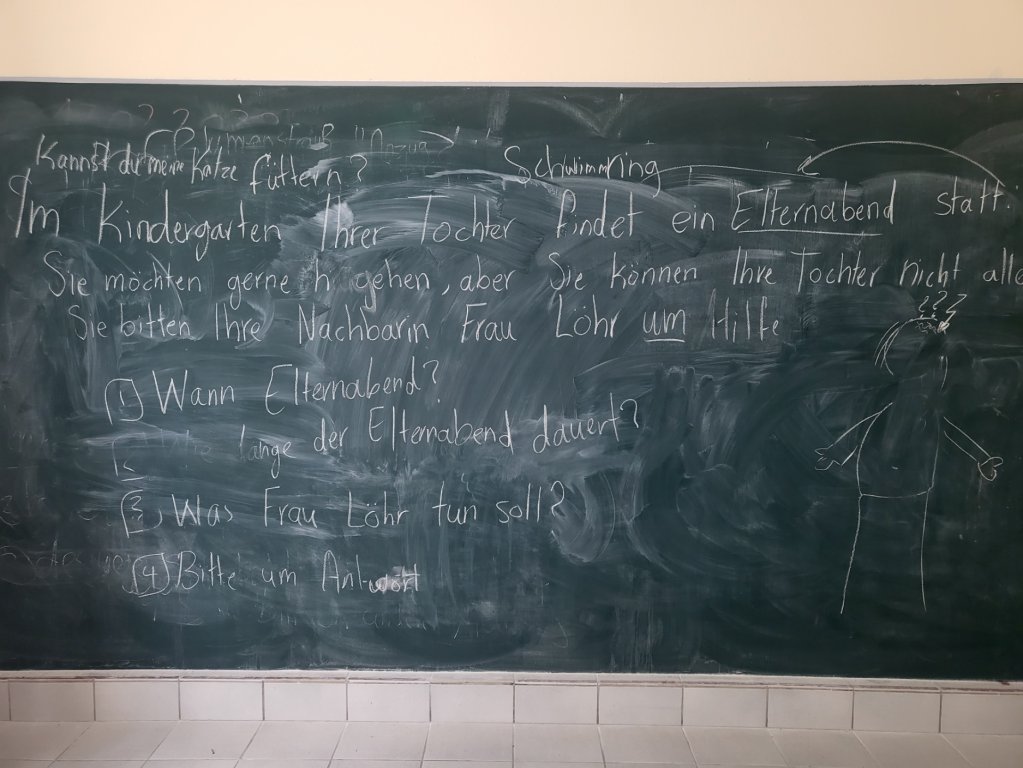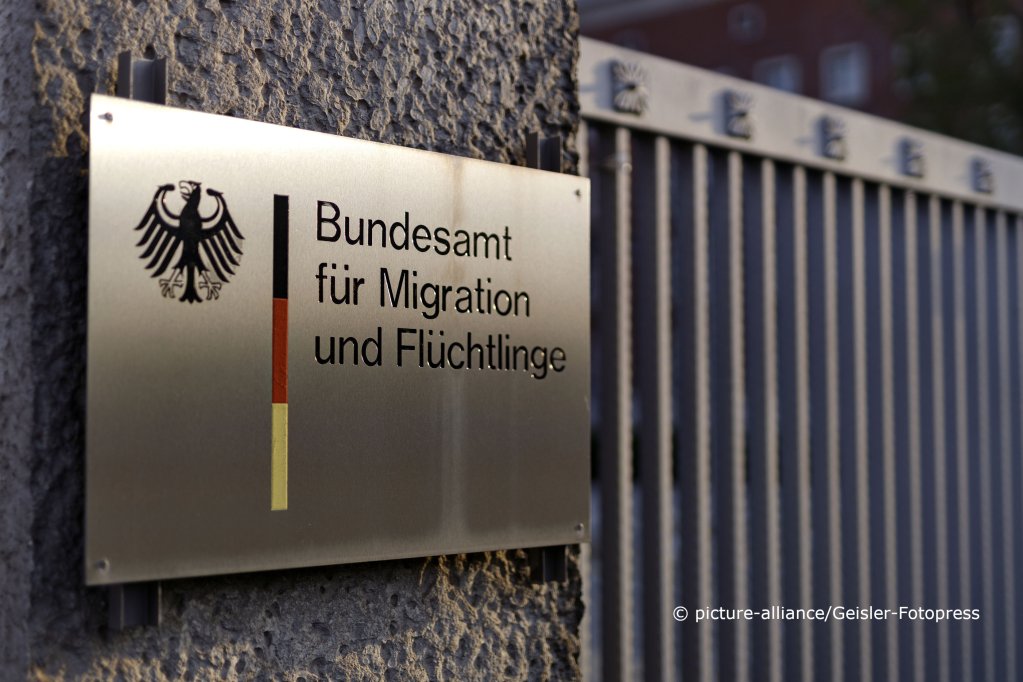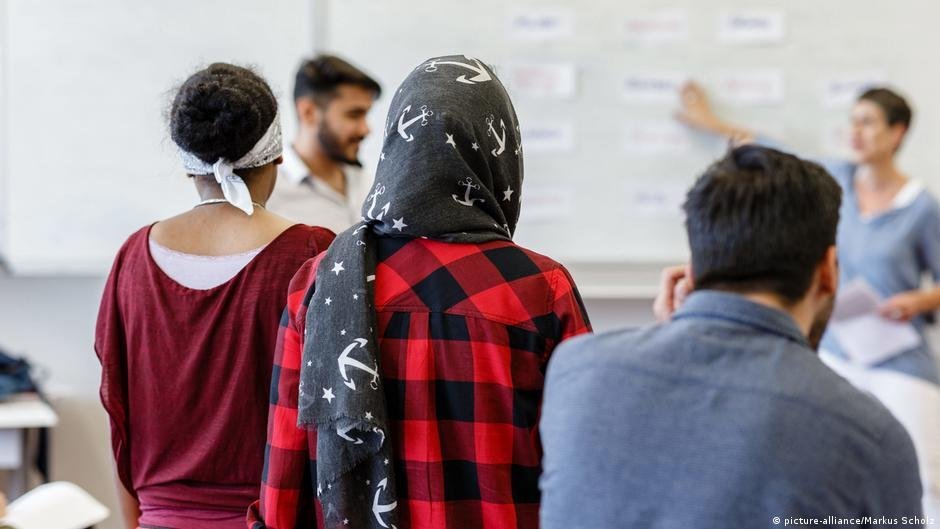According to research from the German state regional broadcaster WDR, some migrants taking German language tests for integration have been cheating the tests, by paying for the correct answers. Authorities are now investigating the allegations.
Yasmin* arrived in Germany fairly recently, and is learning German. She lives in an unnamed city in the federal state of North Rhine-Westphalia (NRW) in western Germany.
She recently told reporters from the German regional state broadcaster WDR that she knew of a Telegram channel where in exchange for 250 euros, you could get the answers to pass a German language test, which is needed to pass an overall integration test.
Allegations of pay for cheating
Yasmin explained that she had taken a B1-level German language test when she realized that some of the other people sitting the exam seemed to have had access to the answers before the test, because they were finished suspiciously fast.
This led her to look into the matter with the help of a reporter team from the WDR platform WDRforyou, which is run in several languages and is targeted at migrants, asylum seekers and refugees.
Also watch: Germany's new naturalization law
Yasmin's name was changed by the WDR reporter team to protect her identity. For the same reason, the team of reporters did not name the city nor center where these allegations might be taking place, because speaking out publicly "could be dangerous for her."
'Hey, how did you finish so quickly?'
Yasmin told the WDR reporters that she spoke to another participant after the exam, asking: "hey how did you finish so quickly?" The woman responded: "My husband bought the answers."
Yasmin told WDR that she was "shocked" by this explanation. Upon asking one more time, the woman reportedly told Yasmin about the alleged Telegram channel.
The woman told Yasmin that the Telegram channel had at least 52 members but did not share the name of the channel itself. One of the Arabic-speaking members of the WDRforyou team began looking for this Telegram channel and later revealed that he was "surprised at how quickly he came across it."
Also read: German citizenship law could prompt 50,000 Turks to apply
Undercover, the reporter, pretended to be someone who also wanted to buy the answers, going by the name Youssuf*.
According to the WDR report, Youssuf apparently had to pay 50 euros to enter the group, which he said was "very uncomplicated."
"The administrator for the channel only seemed interested in the money," he highlighted.
Later, in order to obtain the answers for the language test, Youssuf had to pay an additional 200 euros. After paying up again and two days before he was due to take the test, he says he was sent the questions and answers for the written part of the test.
Integration course with German test
While Youssuf attended the test for the purpose of the WDR investigation, Yasmin needed to take it to prove her level of integration into German society. She is one of hundreds of thousands of migrants, asylum seekers and refugees in Germany who are encouraged to obtain a so-called Integration Course Certificate (Zertifikat Integrationskurs).
Also read: German citizenship, record number of naturalizations
According to the German Federal Bureau for Migration and Refugees (BAMF), the course offers advantages to those who pass it in Germany and can help ease the path to naturalization later on.
In order to obtain the certificate, migrants have to take part in an integration course as well as pass a German language test (Deutsch-Test für Zuwanderer – DTZ), which proves that your German language skills are up to B1 levels.

The DTZ is examined both as a written and an oral exam. The written exam lasts for 100 minutes, according to the BAMF website. In it, those taking the test have to listen to and read in German in order to answer questions. You are also expected to write a short letter as part of the exam.
Also read: Are attitudes towards migrants changing in Germany?
The oral part of the exam lasts for 15 minutes. In the oral exam, BAMF explains, you are expected to introduce yourself to the examiner and then speak to the examiner and another person being examined about a chosen subject.
Language levels
Some of those who take part in the DTZ might end up with an A2 level of German. They are then sent for further lessons, until they can pass the DTZ with a B1 level of German. If you attend all the classes and still fail the B1 test, the German government offers 300 additional hours of lessons and a free repeat of the exam.
Also read: Germany's parliament approves easing dual citizenship laws
In order to prepare for the DTZ, participants can study and do practice tests online. From the BAMF website, you can download links to past exam papers and listening tests so you can get an idea of the themes highlighted in the tests and gauge the level of fluency that you are expected to perform at during the exam.
The German government provides classes for people to learn the language and prepare for the test. The German language institute, Goethe Institut, has developed a special course that they say is geared towards the specific needs of migrants, asylum seekers and refugees.

BAMF to investigate allegations
When the German dpa news agency approached BAMF about these allegations, they were told that they didn't yet have more information, stressing however that they were investigating "unauthorized sharing of exam material."
A BAMF spokesperson told dpa that the tests were run with the highest security standards, which should avoid any kind of cheating during the exam.
According to the BAMF spokesperson, each exam had a new set of questions, and the exam papers were kept in sealed envelopes before being sent out to test centers, adding that they should only be opened by the participants once they arrived in the examination center, and there should be at least two examiners present at all times.

"Any breach of these rules, in order to cheat the exam, would have serious consequences for the institute found to be potentially cheating," BAMF explained further.
They said that any institute found to have breached these rules would be removed from the list of official institutes allowed to run the exams, and that "anyone found breaching the rules as well as the institutes they worked for would be fined."
Tests run every two weeks
Benjamin Beckmann, the head of the integration courses for BAMF, told WDRforyou that he didn't know how anyone could possibly get hold of the exam papers ahead of time and put the answers up on a Telegram channel.
The only thing he could imagine, reported WDR, was that the person running the Telegram channel had somehow had access to the sealed envelopes in the test center beforehand, had opened and photographed them, and had then posted the answers on the Telegram channel in exchange for money.
WDR also reported as part of the investigation that the language exams are run every two weeks, and that up to 20,000 people across Germany take these tests on each occasion.
Test questions found on Telegram channel 'from a real exam'
BAMF has put a centralized test center in Bochum, also in NRW, in charge of rolling out these tests throughout the country (Gesellschaft für Akademische Studienvorbereitung und Testvorbereitung (g.a.s.t./Bochum).
From the center in Bochum, the test questions are brought together and sent out to the 1,467 centers running integration courses and performing associated exams. These centers, according to BAMF, then offer exams at 4,000 different locations, for instance at language schools or universities.
WDRforyou showed the questions and answers bought on the Telegram channel to the director of the test center in Bochum, Jörn Weingärtner.
Weingärtner confirmed that they had indeed been obtained from a real exam.

He underlined, however, that he didn't want all test centers and examiners to now be placed under suspicion.
Weingärtner explained rather that from the center in Bochum, "every two weekends, loads of exam papers are sent out right across Germany, and so they would pass through lots of different hands."
"Because of that, it might be unavoidable that somewhere, there could be a weakness in the system."
Weingärtner added that staff at his center, in collaboration with BAMF, worked continuously to make sure the tests were properly conducted and held to the highest security standards.
He said they and BAMF worked hard to make sure that anyone trying to cheat would be found out.
'How does cheating help?'
"We want to make sure that this kind of criminality is not so easy."
Last year, more than 360,000 people in Germany took the DTZ test. No one knows how many people might have bought the answers in advance in order to pass the test.
Yasmin failed the first test that she took, and is now studying for another one. She told WDRforyou that she was "still angry," about other people cheating at the exam.
"I can't quite believe that you would pay for the answers and still not even be able to write a word correctly in German, not even 'hello' or 'good night,'" Yasmin told WDR. "How does it really help you if after supposedly passing the exam, you can't even chat to the people at the Kindergarten when you pick up your child?" she wondered.
Antisemitism not tolerated if you want to be a German citizen
Once you have passed the DTZ, the next major step in your integration journey in Germany might be naturalization as a citizen in the future.
On March 26, the German Interior Ministry announced that it would make sure that questions about attitudes towards antisemitism would be included in the naturalization test. Questions might include naming the word for a Jewish house of prayer or the year of founding of Israel.
Also read: Germany simplifies naturalization process
These questions in the naturalization test are designed to ensure that those who want to become German nationals share the same democratic and moral values as those promoted by the German government.
As such, denying the Holocaust took place is already punishable by law in Germany, regardless of nationality.
Future Germans need to understand Germany's responsibility to Israel
Because of Germany's past during World War II and its responsibility for the murder of millions of Jews during the Holocaust, expressions of antisemitism in any form cannot be tolerated in Germany. Anyone wishing to become a German citizen therefore would need to demonstrate that they agree with this, and not display any form of antisemitism or racism.
"Themes such as antisemitism, the right of existence for Israel and how Jewish people live in Germany will have a greater presence in future tests," explained a spokesperson for Germany's Interior Ministry, reported the government broadcaster ZDF.
"Antisemitism, racism and any other form of expressing hatred towards groups of people would prevent someone from becoming a German citizen," German Interior Minister Nancy Faeser stated on March 26.

"Germany has a very special responsibility to protect Jewish people and also to protect the state of Israel," explained Faeser.
Also read: How will the new German citizenship law affect you?
The introduction of these new questions in the test, reported ZDF, are in reaction to the rise in reported acts of antisemitism in Germany and the increase in animosity towards the state of Israel following Hamas' attack in Israel on October 7.
ZDF reported that the committee in charge of overhauling the test stressed back in June 2023 already that "(a)nyone who is German, or wants to become so, must know and understand what that means, and take on the special responsibilities Germany and Germans have."
*Name changed by WDRforyou to protect identities
